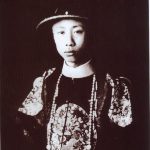 1908 – Puyi becomes Emperor of China at the age of two. Puyi will also be remembered as the last official Emperor of China, since in 1911 this country was declared a Republic by Sun Yat Sen. During the Japanese occupation of Manchuria, Puyi was placed in the role of puppet leader controlled by Tokyo. For this reason, after the liberation of China from the communist forces, the latter was arrested and kept prisoner until 1967, the year in which he would die.
1908 – Puyi becomes Emperor of China at the age of two. Puyi will also be remembered as the last official Emperor of China, since in 1911 this country was declared a Republic by Sun Yat Sen. During the Japanese occupation of Manchuria, Puyi was placed in the role of puppet leader controlled by Tokyo. For this reason, after the liberation of China from the communist forces, the latter was arrested and kept prisoner until 1967, the year in which he would die.
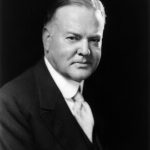 1930 – During the Great Depression, US President Herbert Hoover proposes a $150 million public works program to help create jobs and stimulate the economy. These actions were collectively designed to prevent a cycle of deflation and provide a fiscal stimulus. At the same time, Hoover opposed congressional proposals to provide federal aid to the unemployed, as he believed that such programs were the responsibility of state and local government and philanthropic organizations.
1930 – During the Great Depression, US President Herbert Hoover proposes a $150 million public works program to help create jobs and stimulate the economy. These actions were collectively designed to prevent a cycle of deflation and provide a fiscal stimulus. At the same time, Hoover opposed congressional proposals to provide federal aid to the unemployed, as he believed that such programs were the responsibility of state and local government and philanthropic organizations.
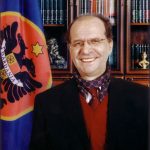 1944 – Ibrahim Rugova was born in Cërrcë, Kosovo. Rugova, was the first President of the Republic, who served from 1992 to 2000 and from 2002 until his death in 2006. He was also a prominent Kosovo Albanian political leader, researcher and writer. He preached peaceful resistance, advocating peaceful resistance to Yugoslav rule and lobbying for US and European support, especially during the Kosovo War. Due to his role in the history of Kosovo, Rugova has been called the “Father of the Nation”.
1944 – Ibrahim Rugova was born in Cërrcë, Kosovo. Rugova, was the first President of the Republic, who served from 1992 to 2000 and from 2002 until his death in 2006. He was also a prominent Kosovo Albanian political leader, researcher and writer. He preached peaceful resistance, advocating peaceful resistance to Yugoslav rule and lobbying for US and European support, especially during the Kosovo War. Due to his role in the history of Kosovo, Rugova has been called the “Father of the Nation”.
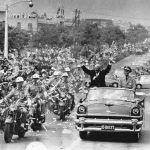 1954 – The Sino-American Treaty of Mutual Defense is signed between the United States and Taiwan in Washington. This was a defense pact between the United States of America and the Republic of China (Taiwan), in effect from 1955 to 1979. This treaty essentially prevented the People’s Republic of China from taking over the island of Taiwan. Some of its contents were carried over into the Taiwan Relations Act of 1979.
1954 – The Sino-American Treaty of Mutual Defense is signed between the United States and Taiwan in Washington. This was a defense pact between the United States of America and the Republic of China (Taiwan), in effect from 1955 to 1979. This treaty essentially prevented the People’s Republic of China from taking over the island of Taiwan. Some of its contents were carried over into the Taiwan Relations Act of 1979.
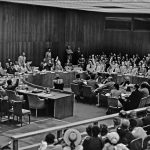 1957 – The United Nations passed resolution 126. This resolution was adopted on December 2, 1957. It was the last of three resolutions passed in 1957 to address the dispute between the governments of India and Pakistan over the territories of Jammu. and Kashmir. The war in these two disputed provinces between India and Pakistan, over the years, has caused thousands of people’s lives to be lost, and has provoked a large-scale population exodus.
1957 – The United Nations passed resolution 126. This resolution was adopted on December 2, 1957. It was the last of three resolutions passed in 1957 to address the dispute between the governments of India and Pakistan over the territories of Jammu. and Kashmir. The war in these two disputed provinces between India and Pakistan, over the years, has caused thousands of people’s lives to be lost, and has provoked a large-scale population exodus.
 1971 – The provinces of Abu Dhabi, Ajman, Fujairah, Sharjah, Dubai and Umm al-Quwain form the state of the United Arab Emirates. On December 2, 1971, at the Dubai Hospitality Hotel, now known as Union House, six of the emirates agreed to enter a union called the United Arab Emirates. The region of Ras al-Khaimah joined later on January 10, 1972. The UAE today is one of the most prosperous states not only in the Middle East, but also beyond.
1971 – The provinces of Abu Dhabi, Ajman, Fujairah, Sharjah, Dubai and Umm al-Quwain form the state of the United Arab Emirates. On December 2, 1971, at the Dubai Hospitality Hotel, now known as Union House, six of the emirates agreed to enter a union called the United Arab Emirates. The region of Ras al-Khaimah joined later on January 10, 1972. The UAE today is one of the most prosperous states not only in the Middle East, but also beyond.
 1982 – At the University of Utah, Barney Clark becomes the first person to be implanted with a permanent artificial heart. An artificial heart is a device that replaces a natural one. They are used to pass the time during the transplant, or to permanently replace the heart in case a heart transplant is impossible. Although other similar inventions preceded it, by the late 1940s, the first artificial heart to be successfully implanted in a human was the Jarvik-7 in 1982, designed by a team including Willem Johan Kolff and Robert Jarvik.
1982 – At the University of Utah, Barney Clark becomes the first person to be implanted with a permanent artificial heart. An artificial heart is a device that replaces a natural one. They are used to pass the time during the transplant, or to permanently replace the heart in case a heart transplant is impossible. Although other similar inventions preceded it, by the late 1940s, the first artificial heart to be successfully implanted in a human was the Jarvik-7 in 1982, designed by a team including Willem Johan Kolff and Robert Jarvik.
 1993 – Death in Medellin shot dead by police agents, Pablo Escobar. Escobar, was one of Colombia’s biggest drug traffickers, terrorist, and politician who founded and was the sole leader of the Medellin Cartel. Dubbed the “King of Cocaine”, Escobar is the richest criminal in history, having accumulated an estimated net worth of US$30 billion by the time of his death. While his drug cartel monopolized the cocaine trade in the United States in the 1980s and 1990s.
1993 – Death in Medellin shot dead by police agents, Pablo Escobar. Escobar, was one of Colombia’s biggest drug traffickers, terrorist, and politician who founded and was the sole leader of the Medellin Cartel. Dubbed the “King of Cocaine”, Escobar is the richest criminal in history, having accumulated an estimated net worth of US$30 billion by the time of his death. While his drug cartel monopolized the cocaine trade in the United States in the 1980s and 1990s.







